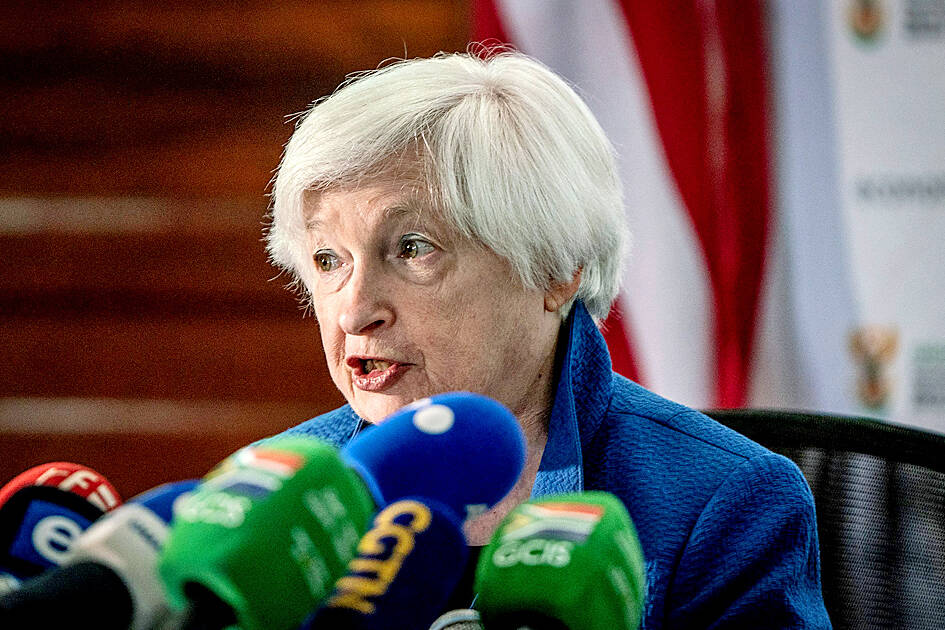US Secretary of the Treasury Janet Yellen said persistently weak inflation is likely to return as a long-term challenge for the economy and policymakers once COVID-19-era distortions behind the recent surge subside and prices cool.
“We’re just coming through an unusual and difficult period, but I do not think we’re in any way back to the ’80s and ’70s,” she said in an interview, referring to an era of rising prices and wages.
Yellen, along with US Federal Reserve Chairman Jerome Powell and many in the US economic establishment, incorrectly predicted in 2021 that the burst of inflation would be “transitory.”

Photo: AFP
She has since admitted getting that call wrong and supported the Fed’s efforts to rein in prices with aggressive interest rate hikes, which risk pushing the US into a recession.
Yellen said that unlike in the 1970s and early 1980s, this episode of high inflation has not triggered a wage-price spiral, a dynamic in which workers demand raises in anticipation of higher prices, prompting firms to increase prices.
Economists look for signs of such a spiral in inflation expectations.
“Expectations have been well-anchored, and I believe they’re still pretty well anchored,” she said in the interview in Johannesburg on Friday, on the final leg of a three-nation visit to Africa. “So we’re not seeing a wage-price spiral. That’s not happening.”
The annual increase in the consumer price index topped out at 9.1 percent in June last year, but slowed to 6.5 percent as of last month in response to the Fed’s rate hikes, as well as easing supply chain stresses and sliding oil prices.
Former US secretary of the Treasury Lawrence Summers and former IMF chief economist Kenneth Rogoff are among those who have warned the world’s economy is entering a period of geopolitical tensions and debt crises that risk making episodes of high inflation and high interest rates more common.
Former IMF chief economist Olivier Blanchard, is more aligned with Yellen, saying that today’s inflation should not last and that central banks, including the Fed, would face a return to an environment where interest rates are uncomfortably close to zero.
He has proposed that central banks lift their inflation targets from 2 percent to 3 percent to counter that.
“The pandemic created such unusual disruptions in the economy,” Yellen said. “There were just a lot of supply chain problems. We really hit the wall in a bunch of different sectors and prices really skyrocketed.”

COMPETITION: AMD, Intel and Qualcomm are unveiling new laptop and desktop parts in Las Vegas, arguing their technologies provide the best performance for AI workloads Advanced Micro Devices Inc (AMD), the second-biggest maker of computer processors, said its chips are to be used by Dell Technologies Inc for the first time in PCs sold to businesses. The chipmaker unveiled new processors it says would make AMD-based PCs the best at running artificial intelligence (AI) software. Dell has decided to use the chips in some of its computers aimed at business customers, AMD executives said at CES in Las Vegas on Monday. Dell’s embrace of AMD for corporate PCs — it already uses the chipmaker for consumer devices — is another blow for Intel Corp as the company

STIMULUS PLANS: An official said that China would increase funding from special treasury bonds and expand another program focused on key strategic sectors China is to sharply increase funding from ultra-long treasury bonds this year to spur business investment and consumer-boosting initiatives, a state planner official told a news conference yesterday, as Beijing cranks up fiscal stimulus to revitalize its faltering economy. Special treasury bonds would be used to fund large-scale equipment upgrades and consumer goods trade-ins, said Yuan Da (袁達), deputy secretary-general of the Chinese National Development and Reform Commission. “The size of ultra-long special government bond funds will be sharply increased this year to intensify and expand the implementation of the two new initiatives,” Yuan said. Under the program launched last year, consumers can

Citigroup Inc and Bank of America Corp said they are leaving a global climate-banking group, becoming the latest Wall Street lenders to exit the coalition in the past month. In a statement, Citigroup said while it remains committed to achieving net zero emissions, it is exiting the Net-Zero Banking Alliance (NZBA). Bank of America said separately on Tuesday that it is also leaving NZBA, adding that it would continue to work with clients on reducing greenhouse gas emissions. The banks’ departure from NZBA follows Goldman Sachs Group Inc and Wells Fargo & Co. The largest US financial institutions are under increasing pressure

FUTURE TECH: Nvidia CEO Jensen Huang would give the keynote speech at this year’s Consumer Electronics Show, which is also expected to highlight autonomous vehicles Gadgets, robots and vehicles imbued with artificial intelligence (AI) would once again vie for attention at the Consumer Electronics Show (CES) this week, as vendors behind the scenes would seek ways to deal with tariffs threatened by US president-elect Donald Trump. The annual Consumer Electronics Show opens formally in Las Vegas tomorrow, but preceding days are packed with product announcements. AI would be a major theme of the show, along with autonomous vehicles ranging from tractors and boats to lawn mowers and golf club trollies. “Everybody is going to be talking about AI,” Creative Strategies Inc analyst Carolina Milanesi said. “From fridges to ovens